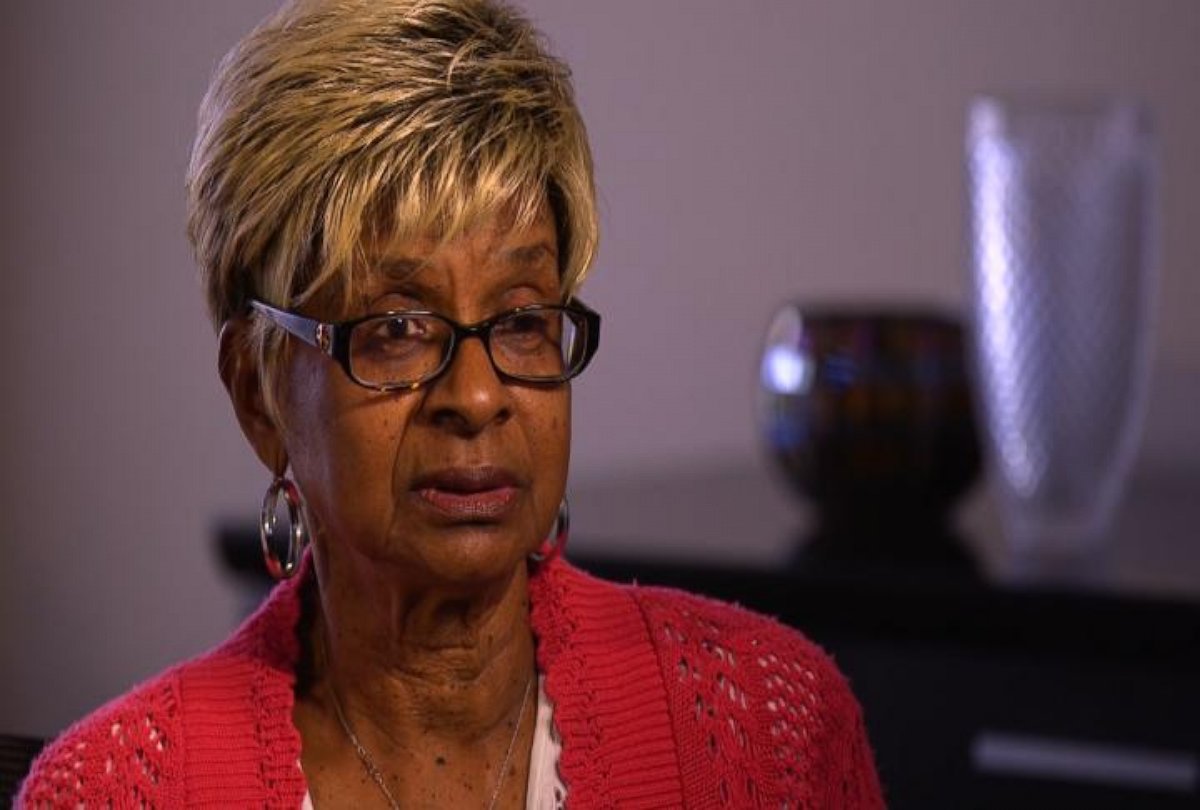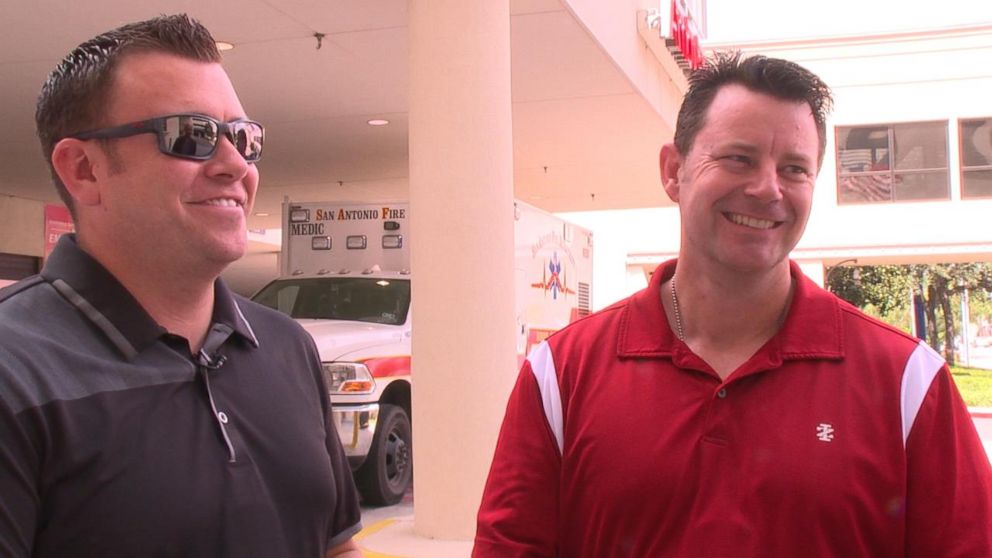The Deadly Consequences When Police Lack Proper Training to Handle Mental Illness Calls
Two San Antonio officers are revolutionizing police tactics.
— -- Shirley Marshall Harrison's voice sounds calm on the 911 call, as she told the operator she needed police officers to help get her son to a hospital. She says he was off his medication.
"He has bipolar schizophrenia," she said. "Make sure they are trained police officers."
A body cam video from one of two Dallas police officers who responded shows what happened after they arrived at the Harrison home. Shirley Marshall Harrison opens the door. Her son, 38-year-old Jason Harrison, followed her to the front door. He walked outside, twisting a screwdriver in his hands. The police officers repeatedly told him drop the screwdriver, then drew their weapons as Shirley screamed at them not to shoot.
The officers fired. Harrison's mother can be heard wailing, "Oh, they killed my child, Oh, they killed my child."
Eight seconds after he came to the door, Jason Harrison lay dying in his mother's driveway. He had been shot five times, twice in the back. The officers said they were forced to shoot Harrison after he came at them with the screwdriver and failed to follow instructions to drop it, but his family says he never posed any threat.
"I didn't call for them to take him to the morgue," Shirley Harrison told "Nightline," reflecting on the June 2014 incident. "I called for medical help."
Jason was diagnosed with bipolar schizophrenia in his early 20s. The Harrisons said they often called for help to get him to a hospital when he went off his medication. But this time, things went very wrong.
"The training that these guys are lacking that's causing these type of tragedies in our community is what needs to be changed, what needs to be addressed," said Jason's brother David Sean Harrison.

A grand jury declined to indict the two officers in the incident, ruling that it was a justified use of force. The Harrison family has filed a lawsuit against the officers, the Dallas Police Department and the city of Dallas.
Defendants have sought to dismiss the lawsuit, and argue that their use of deadly force was reasonable under the circumstances. But they've declined to comment to ABC News since the case is still pending.
Jason Harrison's name has now become one among many others, such as Lavall Hall, Dontre Hamilton and James Boyd, all mentally ill Americans who have ended up on the wrong side of an officer's gun in the last two years in what many even inside law enforcement are calling a crisis in American policing.
Nationwide, at least 125 people with signs of mental illness had died in police encounters in the U.S. during the first six months of 2015, according to a recent Washington Post investigation.
The youngest was Kristiana Coignard, who was only 17 years old.
In San Antonio, just hours from where Jason Harrison was killed, a specialized team of police officers known as the San Antonio Mental Health Unit is working to revolutionize policing.
"What I can't stress enough, and what I truly feel in my heart, is that this is the future of policing. Mental health and crisis intervention is the future of police work," said Officer Joe Smarro.
Smarro and his partner Officer Ernie Stevens with the San Antonio police department are plainclothes officers who ride in an unmarked car to respond to calls involving mental illness cases. They are experts in what is called Crisis Intervention Training (CIT). Smarro says their approach is the "complete opposite" from how the average officer would approach a 911 call.
"We walk in, it's not 'hey, I'm Officer Smarro, this is Officer Stevens,' It's, 'how you doing? ... My name is Joe. This is Ernie. We work with the San Antonio Police Department,'" Smarro said. "I'll display my badge that I wear. We wear these plain clothes. We're just here to help you."
Stevens says that as a patrol officer, he dreaded calls involving the mentally ill.
"That was the call I hated most, was when you heard that dispatcher call in and say, 'there's an individual at this house that has schizophrenia, that's hearing voices, he's talking about suicide,'" Stevens said. "I had absolutely no training in that, so I really did not know how to respond to that."
All that changed after Stevens reluctantly attended a week-long CIT session and met a woman who talked about what it was like to live with her adult son, who has schizophrenia.
"She talked about her son ... his paranoia, her fear, how she now lives inside of his illness, instead of enjoying her years of retirement," Stevens said. "But then she made this statement: She said one day, one of you officers will have to come to my house and you might have to shoot and kill my son, and I want you to know that that's OK because I want you to go home safe to your family,'" Stevens said. "It was at that moment that we made a pact that we were going to go … and ask the chief if we could start a mental health unit to help family members just like her."

When Smarro and Stevens watched the Jason Harrison video, they said they hate to see this happen. Stevens said, "talking to family members here in San Antonio, this is their biggest fear of calling the police."
"That's why the training is so important," he added.
While with "Nightline," Smarro and Stevens responded to a local welfare call. An estranged husband had called 911 and asked that someone check on his wife, who was a veteran and had told him she was in a lot of pain. When Smarro and Stevens arrived at the home, they found the woman unconscious and it appeared she had taken multiple bottles of pills. She had only a faint pulse. An ambulance arrived to rush her to the hospital.
In the end, the woman survived, but it was clear the ordeal has an emotional toll on the officers.
"My heart's broken for her, sad for the family, sad for the husband, you just wish you could do more when you find somebody in that situation," Stevens said. "There's no way you can do this day in and day out and not have a human approach to this or respond with emotion. I mean, I don't think it's possible."
According to a survey by the Police Executive Research Forum (PERF), a police research and policy nonprofit, new recruits typically have 60 hours of training to learn how to handle a gun, but only eight hours of training to learn strategies for handling the mentally ill.
"I don't think you can look at the past year and not walk away saying, this is a significant moment for the policing community," said Chuck Wexler, the executive director of PERF. "We have to ask ourselves, what are the best practices? And I think some of the conventional training has to be turned on its head."
Smarro, a former Marine, believes the problem begins with the culture of policing from the beginning. He says police academies mimic military bootcamps, with in-your-face, high intensity yelling.
"You know, gun retention, safety, and 'they're going to get you and they're going to kill you,' you know, this big mindset of 'fast, fast, fast' and 'think on your feet and respond,'" Smarro said. "That's great, but then you graduate, and then you go to the streets of, 'my 13-year-old daughter is missing,' 'my 18-year-old daughter is wanting to kill herself' ... all of a sudden, we gotta come down."
For Smarro, when they get calls like the suicide attempt, it hits home because he said he too had considered suicide "more than once."
"A lot of the time I see myself. That's what allows me to do what I feel like is a good job," he said.
While few officers will choose to join specialized units, Smarro and Stevens agree with experts that say training in dealing with the mentally ill should be mandatory for all law enforcement. And it may also be a good use of taxpayer's money. One study from The Center for Healthcare Services, San Antonio's local mental health authority, showed the city saved $50 million over the past five years by diverting the mentally ill from the city's jails and prisons into treatment facilities.




